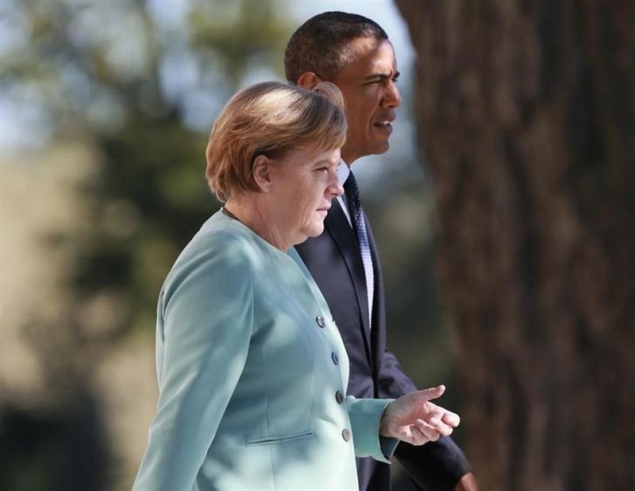- Home
- Internet
- Internet News
- Merkel tapping allegations prompt Germany to send intelligence chiefs to US
Merkel-tapping allegations prompt Germany to send intelligence chiefs to US

Merkel has demanded action from President Barack Obama, not just apologetic words, following the accusations that the U.S. National Security Agency (NSA) accessed tens of thousands of French phone records as well as monitoring her own private phone.
"We are talking to the Americans to clear things up as quickly as possible," the German government's deputy spokesman Georg Streiter said.
"A high level delegation will travel for talks with the White House and National Security Agency to push forward the investigation into the recent allegations," he told a news conference.
Berlin will dispatch the heads of its foreign intelligence agency BND and of its domestic counterpart, the BfV. Merkel's chief of staff Ronald Pofalla, who is responsible for the intelligence services, may also join them.
Speaking at an EU summit on Thursday, Merkel said the alleged bugging had shattered trust with the United States. She demanded Washington agree a "no spying" deal with Berlin and Paris by the end of the year, saying alleged espionage against two of Washington's closest EU allies had to be stopped.
The White House has denied the United States is bugging Merkel, but Washington officials have refused to say whether it did so in the past.
Members of the European Parliament's civil liberties committee said they will also fly to Washington for talks on Monday and explore "possible legal remedies for EU citizens".
The rift over U.S. surveillance tactics first emerged earlier this year and had appeared close to resolution, but Berlin said on Wednesday it has obtained information that the United States may have monitored Merkel's phone.
Earlier this week French newspaper Le Monde reported the NSA had collected tens of thousands of French phone records between December 2012 and January this year.
Only three months ago Merkel's Interior Minister Hans-Peter Friedrich made a similar visit to demand answers in Washington. The need for another trip has left Germany looking like it was duped and brought fierce criticism of Merkel for not taking a tough enough stance.
"In the summer, we received explanations and assurances," Foreign Minister Guido Westerwelle said on Thursday. "Whether we can trust these explanations and assurances, that must be examined again."
Sensitive subject
State surveillance is a highly sensitive subject in a country haunted by memories of eavesdropping by the Stasi secret police in communist East Germany, where Merkel grew up.
The European Parliament has already opened an inquiry into the effect on Europe of U.S. intelligence activities revealed by former NSA contractor Edward Snowden. It has also led a push for tougher data protection rules and the suspension of a transatlantic data-sharing deal.
The Parliament, with 766 members directly elected from the EU's 28 member states, voted this week in favour of an amended package of laws that would greatly strengthen EU data protection rules that date from 1995.
The rules would restrict how data collected in Europe by firms such as Facebook, Yahoo! and Google is shared with non-EU countries, and impose fines of 100 million euros or more on rule breakers.
© Thomson Reuters 2013
Get your daily dose of tech news, reviews, and insights, in under 80 characters on Gadgets 360 Turbo. Connect with fellow tech lovers on our Forum. Follow us on X, Facebook, WhatsApp, Threads and Google News for instant updates. Catch all the action on our YouTube channel.
Related Stories
- Samsung Galaxy Unpacked 2026
- iPhone 17 Pro Max
- ChatGPT
- iOS 26
- Laptop Under 50000
- Smartwatch Under 10000
- Apple Vision Pro
- Oneplus 12
- OnePlus Nord CE 3 Lite 5G
- iPhone 13
- Xiaomi 14 Pro
- Oppo Find N3
- Tecno Spark Go (2023)
- Realme V30
- Best Phones Under 25000
- Samsung Galaxy S24 Series
- Cryptocurrency
- iQoo 12
- Samsung Galaxy S24 Ultra
- Giottus
- Samsung Galaxy Z Flip 5
- Apple 'Scary Fast'
- Housefull 5
- GoPro Hero 12 Black Review
- Invincible Season 2
- JioGlass
- HD Ready TV
- Latest Mobile Phones
- Compare Phones
- Tecno Pova Curve 2 5G
- Lava Yuva Star 3
- Honor X6d
- OPPO K14x 5G
- Samsung Galaxy F70e 5G
- iQOO 15 Ultra
- OPPO A6v 5G
- OPPO A6i+ 5G
- Asus Vivobook 16 (M1605NAQ)
- Asus Vivobook 15 (2026)
- Brave Ark 2-in-1
- Black Shark Gaming Tablet
- boAt Chrome Iris
- HMD Watch P1
- Haier H5E Series
- Acerpure Nitro Z Series 100-inch QLED TV
- Asus ROG Ally
- Nintendo Switch Lite
- Haier 1.6 Ton 5 Star Inverter Split AC (HSU19G-MZAID5BN-INV)
- Haier 1.6 Ton 5 Star Inverter Split AC (HSU19G-MZAIM5BN-INV)







![[Partner Content] OPPO Reno15 Series: AI Portrait Camera, Popout and First Compact Reno](https://www.gadgets360.com/static/mobile/images/spacer.png)









